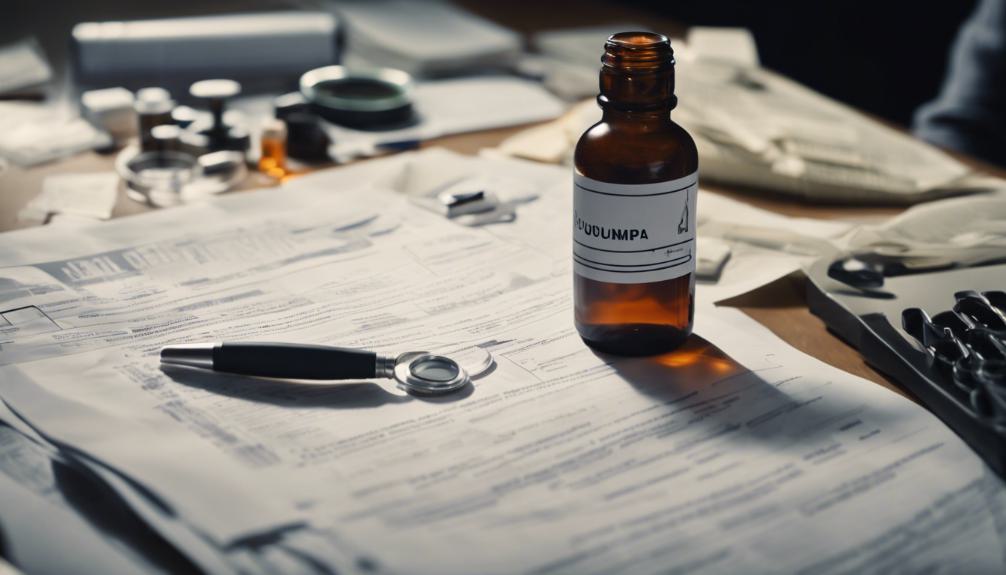Low Grade Lymphoma Lawsuit
Just as David faced Goliath with little more than faith and a sling, many individuals today find themselves confronting giants in the form of corporate behemoths. In our pursuit of justice, particularly concerning the link between Roundup and low-grade lymphoma, we're navigating a complex legal and medical landscape. We understand the gravity of this situation and the myriad questions you might have about eligibility, the intricacies of filing a lawsuit, and what compensation could look like. Let us guide you through the essential steps and considerations, offering a beacon of hope in what may seem like an insurmountable battle.

Understanding Low-Grade Lymphoma

Low-grade lymphoma, a type of non-Hodgkin lymphoma, is a slow-growing cancer that affects the body's lymphatic system. It's a condition we can't ignore, given its subtle onset and gradual progression. Unlike its high-grade counterparts, its symptoms may not be immediately alarming, which often leads to delayed diagnosis. We've learned it's crucial to understand its nature to recognize the signs early and seek timely intervention.
This cancer targets the lymphocytes, a type of white blood cell pivotal in our immune response. When affected, the body's ability to fight infections diminishes, leaving us vulnerable. We've seen swollen lymph nodes, fatigue, and unexplained weight loss among the common symptoms, but they're easily mistaken for signs of less serious conditions. It's this insidious nature that makes awareness and knowledge about low-grade lymphoma vital.
We're aware that treatment options vary depending on the stage and specific characteristics of the lymphoma. They can range from watchful waiting for asymptomatic cases to more aggressive interventions like chemotherapy for advanced stages. We emphasize the importance of regular check-ups and consultations with healthcare professionals to navigate this complex condition effectively.
The Link Between Roundup and Cancer

We're now turning our attention to the critical connection between Roundup and cancer, a concern that's sparked widespread debate. We'll explore recent findings on Roundup cancer research, examine the health implications of its main ingredient, glyphosate, and provide an overview of the ongoing legal battles. This discussion aims to shed light on the complexities surrounding Roundup's safety and its legal ramifications.
Roundup Cancer Research Findings
Numerous studies have pointed out a concerning link between Roundup, a widely used herbicide, and the development of cancer, particularly non-Hodgkin's lymphoma. We've dug into the research and found that the evidence is not just anecdotal; there's scientific backing to these claims. Multiple independent studies have highlighted a higher incidence of this type of cancer among individuals with prolonged exposure to Roundup. Given the widespread use of this product, the implications are significant. It's not just farm workers who are at risk; homeowners and gardeners who use this product might also be unknowingly exposing themselves to a potential health hazard. We're committed to keeping the public informed about these findings as the research continues to evolve.
Glyphosate's Health Implications
At the heart of the controversy surrounding Roundup is glyphosate, the herbicide's active ingredient, which has been linked to cancer risks. We've seen a growing body of research suggesting that prolonged exposure to glyphosate can increase the risk of developing certain types of cancer, notably non-Hodgkin lymphoma. It's concerning for us, especially considering how widely used Roundup has become in both agricultural and residential settings.
The debate over glyphosate's safety isn't just academic; it affects real people's lives. We're aware that farmers, landscapers, and garden enthusiasts who frequently use Roundup may be at a higher risk. This connection between glyphosate and cancer underscores the need for more stringent regulations and better safety measures to protect public health. It's clear we can't ignore these potential risks any longer.
Legal Battles Overview
The legal landscape surrounding Roundup's link to cancer has evolved into a battleground, where victims allege harm from glyphosate exposure. We've seen countless individuals come forward, armed with medical evidence and determination, seeking justice against Monsanto, the manufacturer. Their claims? That long-term exposure to Roundup's main ingredient, glyphosate, has led to various forms of cancer, most notably non-Hodgkin's lymphoma. As these cases have piled up, courts across the country have been forced to reckon with the potential dangers of this widely used herbicide. Amidst this legal turmoil, we've witnessed significant verdicts in favor of the plaintiffs, highlighting the growing concern over glyphosate's safety. It's a complex and ongoing fight, but one thing's clear: the stakes couldn't be higher for those affected.
Navigating the Legal Landscape

We'll need to understand the complexities of the legal system to successfully navigate through the Roundup lawsuit process. It's a journey fraught with detailed procedures and legal nuances that can easily overwhelm anyone not versed in the law. Our collective aim is to demystify this path, ensuring we're well-prepared to face the hurdles ahead.
First off, it's crucial we get to grips with the statute of limitations. Timing isn't just important; it's potentially decisive. Missing a deadline could mean losing our chance at justice and compensation. We're also focusing on gathering and preserving evidence. This isn't just about proving exposure to Roundup; it's about clearly linking it to low-grade lymphoma. Medical records, purchase receipts, and expert testimonies become our arsenal in this legal battle.
Moreover, understanding the difference between individual lawsuits and class action suits is pivotal. Each has its strategic advantages and potential downsides. We're weighing these options carefully, considering what's best for our unique situations.
Throughout this process, we're relying heavily on the expertise of specialized attorneys. Their guidance is indispensable, from navigating pre-trial procedures to representing our interests in court. It's a complex journey, but together, we're making headway, step by detailed step.
Eligibility Criteria for Filing

Determining if you're eligible to file a lawsuit requires understanding specific criteria, including the extent of your exposure to Roundup and any resulting health issues. It's crucial we first assess how long and how frequently you've used Roundup. The nature of your exposure plays a significant role; for instance, occupational exposure, such as in farming or landscaping, might meet the criteria more readily compared to incidental home use.
Next, we'll need to evaluate the health impacts directly linked to this exposure. A diagnosis of low-grade lymphoma or other related cancers that scientific studies have associated with Roundup's active ingredient, glyphosate, is central to establishing eligibility. It's not just about having been exposed; it's about demonstrating that the exposure has led to specific health consequences.
We also consider the timeline between exposure and diagnosis. There's usually a window during which your claim remains valid. This period varies, so we'll need to pinpoint when the first exposure occurred and when the diagnosis was made. Understanding these nuances is vital to determining if we can move forward with your lawsuit.
Preparing Your Lawsuit Documentation

As we prepare to build our case, it's crucial we gather all necessary documents, emphasizing the importance of medical records and establishing a clear timeline of exposure. This foundation will not only strengthen our lawsuit but also streamline the legal process ahead. We'll start by highlighting how to collect these essential pieces, ensuring we're fully equipped to pursue justice.
Gathering Essential Documents
Gathering the right documents is crucial in building a strong case for your Roundup low-grade lymphoma lawsuit. We'll need to compile a comprehensive set of records that not only demonstrate the use of Roundup but also establish a timeline and connection to the diagnosis. It's not just about proving exposure; it's about painting a clear picture of how that exposure has led to significant health repercussions.
We're looking at assembling purchase receipts, any existing communication with Monsanto, and documentation of Roundup use in your daily or occupational activities. These pieces of evidence are foundational in linking the product directly to you and your diagnosis, setting the stage for a compelling argument against the manufacturer. This preparation is a meticulous process, but it's essential for our pursuit of justice.
Medical Records Importance
We'll also need to collect all relevant medical records, as they're crucial for substantiating our claim that Roundup exposure led to the development of low-grade lymphoma. These documents not only provide a detailed history of our health condition but also offer concrete evidence of diagnosis, treatments, and the impact on our daily lives. It's imperative that we gather every piece of medical documentation available, from initial doctor visits to the most recent treatments. This includes pathology reports, diagnostic test results, and records of any related medical consultations. Having a comprehensive collection of these records will strengthen our case, demonstrating a clear link between the use of Roundup and our health issues. It's a vital step in ensuring our voices are heard and our cases are taken seriously.
Timeline of Exposure
To bolster our case against Roundup, it's essential we meticulously document the timeline of our exposure to this chemical. Understanding when and how often we've been in contact with Roundup will play a pivotal role in establishing a direct link to our diagnosis. We'll need to recount specific instances of use, including dates, locations, and the extent of exposure. It's also crucial we identify any protective measures we might've taken, or lack thereof, as this can influence the strength of our claim. By piecing together this timeline, we're not just recounting our history with Roundup; we're building a solid foundation for our lawsuit. This detailed chronology will enable our legal team to effectively argue our case, demonstrating a clear cause-and-effect relationship.
Key Legal Challenges and Solutions

Navigating the legal landscape of the Roundup lawsuit presents several complex challenges, yet we've identified effective strategies to address them. One of the primary hurdles is establishing a direct link between Roundup exposure and low-grade lymphoma, given the latency period and potential exposure to other chemicals. To combat this, we're leveraging comprehensive epidemiological studies and expert testimonies that underscore the carcinogenicity of glyphosate, Roundup's active ingredient.
Additionally, we're confronted with the defendant's robust legal team and their extensive resources. To level the playing field, we've consolidated claims into multidistrict litigation (MDL), allowing for a more efficient process and sharing of resources among plaintiffs. This strategy not only streamlines the legal process but also strengthens the collective bargaining power of the affected individuals.
Another challenge is navigating the statute of limitations, which varies by state. We're meticulously documenting exposure timelines and diagnosis dates to ensure that none of our clients are unjustly barred from seeking compensation due to technicalities. By staying proactive and vigilant in these areas, we're overcoming the obstacles posed by this complex litigation, moving closer to securing justice and compensation for our clients.
Selecting the Right Attorney

As we turn our focus to choosing the right attorney, it's crucial we consider their experience and expertise specifically in handling Roundup lawsuit cases. We need someone who's not just skilled but also readily available to communicate with us throughout this journey. Their ability to clearly explain complex legal matters and keep us informed will be pivotal in navigating our case successfully.
Attorney Experience and Expertise
Choosing the right attorney, one with substantial experience and expertise in low-grade lymphoma lawsuits, is crucial for achieving a successful outcome in a Roundup case. We understand that the intricacies of such cases demand a lawyer who's not only well-versed in the law but also knowledgeable about the specific health implications and scientific research related to Roundup exposure. It's why we emphasize looking for attorneys who have a proven track record of handling similar cases. Their familiarity with the legal strategies, negotiation tactics, and courtroom procedures specific to these lawsuits can significantly impact the case's outcome. Moreover, an experienced attorney can navigate the complexities of litigation against large corporations, ensuring that we're well-represented and our interests are vigorously defended throughout the legal process.
Communication and Availability
After identifying an attorney with the necessary experience and expertise, it's essential to consider how well they communicate and are available to address our concerns. We've found that a lawyer's responsiveness can significantly impact our comfort and confidence throughout the legal process. It's not just about being able to get in touch; it's about feeling heard and understood. We prioritize attorneys who offer clear, timely updates and are willing to explain complex legal concepts in plain language. Accessibility is critical, too. We look for legal professionals who make it easy to schedule meetings, whether in person, over the phone, or through video calls. Ultimately, choosing an attorney who values open communication and is readily available ensures we're supported every step of the way.
The Role of Scientific Evidence

We'll delve into how scientific evidence critically shapes the Roundup lawsuit, especially concerning claims of low-grade lymphoma. Scientific evidence serves as the backbone of these lawsuits, providing the crucial link between Roundup exposure and the development of low-grade lymphoma. It's not just about presenting data; it's about showcasing rigorous, peer-reviewed studies that demonstrate a significant association between the herbicide and the disease.
Our understanding and interpretation of scientific findings directly influence the strength and direction of the lawsuit. We rely on epidemiological studies, toxicological data, and expert testimonies to construct a compelling narrative that Roundup's glyphosate-based formulation contributes to the risk of developing low-grade lymphoma. These pieces of evidence are meticulously analyzed and presented to support the claims of those affected.
It's essential to distinguish between correlation and causation, a task that requires a deep dive into the scientific method and its outcomes. By doing so, we aim to overcome the challenges posed by counterarguments and skepticism, reinforcing our position with undeniable scientific facts. In essence, the role of scientific evidence is not just to inform but to empower our legal strategy, ensuring that justice is served for those impacted by Roundup exposure.
Litigation Process Explained

Building on the foundation of scientific evidence, let's explore the litigation process involved in the Roundup lawsuit.
First off, it's crucial we understand that filing a lawsuit begins with a complaint, outlining the plaintiff's allegations and the damages sought. In the case of Roundup, individuals who've developed low-grade lymphoma due to its use take this step. We're not just talking about a few isolated cases; there's a wave of litigation sweeping across the courts.
Once the lawsuit is filed, the discovery phase kicks in. Here, both sides exchange evidence, including documents and testimonies. We've seen this process unveil critical information about Roundup's potential health risks and the manufacturer's knowledge of these dangers.
Then, there's the possibility of pre-trial settlements. While we're not diving into specifics about compensation yet, it's worth noting that many cases settle before reaching trial. It's a way for both parties to avoid the unpredictability of a jury's decision.
If a settlement isn't reached, the case proceeds to trial. Here, both sides present their evidence and arguments, and ultimately, a jury decides on the outcome. We're committed to seeing justice served, every step of the way.
Potential Compensation and Settlements

Understanding the potential compensation and settlements in Roundup lawsuits is crucial for those affected by low-grade lymphoma. We're all too aware that facing a health battle like this isn't just emotionally draining; it's financially demanding too. That's where the possibility of receiving compensation comes into play, offering a silver lining in a difficult situation.
Compensation amounts can vary widely based on several factors, including the severity of the illness, the impact on the individual's life, medical expenses incurred, and loss of income. In general, settlements have been known to cover medical bills, ongoing treatment costs, lost wages, and sometimes even punitive damages to punish the wrongdoer and deter future negligence.
It's important for us to remember that each case is unique. While past settlements can offer a ballpark figure, they don't guarantee a specific outcome. We've seen some plaintiffs receive significant amounts, while others less so. The negotiation process plays a crucial role in determining the final settlement amount.
Joining a Class Action Lawsuit

After exploring the compensation landscape, let's now focus on how joining a class action lawsuit might be a viable option for those affected by low-grade lymphoma from Roundup exposure.
Joining a class action lawsuit can provide several benefits. Firstly, it allows us to pool our resources, making it possible to hire more experienced lawyers who specialize in complex litigation against large corporations like Monsanto, the manufacturer of Roundup. This collective approach can significantly increase our chances of success.
Additionally, by participating in a class action, we're not facing the financial burden alone. Legal fees are shared among all plaintiffs, making it a cost-effective option for seeking justice and compensation. It's also less time-consuming for each of us individually, as the legal team manages the case on behalf of the entire group.
Moreover, there's strength in numbers. A class action sends a powerful message to the defendant and can lead to larger settlements or judgments than individual lawsuits might achieve. It also raises public awareness about the risks associated with Roundup, potentially preventing future harm.
Let's consider this path carefully, as it could be our best chance to hold Monsanto accountable and receive the compensation we deserve for our suffering.
Timeline for Resolution

We're likely wondering how long it'll take for our Roundup lawsuit to reach a resolution. The truth is, the timeline can vary significantly based on several factors, including the complexity of the case, the number of plaintiffs involved, and the legal strategies employed by both sides. Generally, we're looking at a process that could span months to several years.
Initially, after filing the lawsuit, there's a period of discovery where both parties gather evidence. This phase alone can take several months. Following discovery, there may be motions filed by either side, which could further extend the timeline. If the case goes to trial, that's another lengthy process, with the trial itself potentially lasting several weeks or months, followed by the possibility of appeals by the losing party.
However, many Roundup lawsuits may be settled out of court. Settlement negotiations can happen at any stage of the process and might lead to a quicker resolution. But it's important to understand that negotiating a fair settlement also takes time, as it involves back-and-forth discussions to reach an agreement that adequately compensates for the harm suffered.
Protecting Your Health and Rights

Navigating the complex landscape of a Roundup lawsuit requires us to prioritize our health and assert our rights firmly. In facing a diagnosis linked to Roundup exposure, it's crucial we take immediate steps to protect our well-being. Seeking specialized medical attention is the first line of defense. A healthcare provider knowledgeable about chemical exposures can offer the most accurate assessments and treatments. It's not just about managing symptoms; it's about ensuring a comprehensive approach to our health that may include lifestyle adjustments and ongoing monitoring.
On the legal front, knowing our rights is paramount. We're entitled to seek compensation for our suffering and losses. This means partnering with legal experts who have a deep understanding of the complexities surrounding Roundup lawsuits. They'll guide us through the process, from gathering necessary medical evidence to representing our interests in court or settlement discussions.
We must also stay informed about the evolving legal landscape and scientific findings related to Roundup. This knowledge empowers us to make informed decisions about our health care and legal strategy. It's about taking control where we can, in a situation that often feels overwhelming. Together, we're not just defending our health; we're asserting our rights against those who've jeopardized them.
Frequently Asked Questions
How Does Low-Grade Lymphoma Affect Daily Life and Work Capabilities?**
We're wondering how low-grade lymphoma impacts our daily routines and work abilities. It's tough, as fatigue and treatment side effects often reduce our productivity and require us to adjust our lifestyles and work commitments.
This Question Delves Into the Personal Impact of the Condition, Focusing on How It Might Alter One's Routine, Work Life, and Overall Quality of Life.
We're exploring how low-grade lymphoma disrupts our daily lives, from routine changes to impacting our work and overall quality of life. It's about understanding the personal struggles and adjustments we have to make.
What Are the Long-Term Health Prognoses for Individuals Diagnosed With Low-Grade Lymphoma Due to Roundup Exposure?**
We're curious about the long-term health outlook for people with low-grade lymphoma from Roundup. It's crucial we understand these impacts, as they could significantly affect our future health and wellbeing.
This Question Seeks Information Beyond the Legal Aspects, Touching on the Medical Outlook and Life Expectancy for Patients After Diagnosis and Treatment.
We're curious about the medical future and lifespan of those diagnosed with low-grade lymphoma after exposure. Specifically, we want to understand their life expectancy and health outlook following diagnosis and subsequent treatment.
Are There Any Specific Lifestyle or Dietary Changes Recommended for Individuals With Low-Grade Lymphoma Linked to Roundup Exposure?**
We're curious if there are any specific lifestyle or dietary changes recommended for those with low-grade lymphoma, especially if it's linked to Roundup exposure. It'd be helpful to know what adjustments could aid recovery.

This post has been generated by AI and was not reviewed by editors. This is Not legal advice. Please consult with an attorney.




